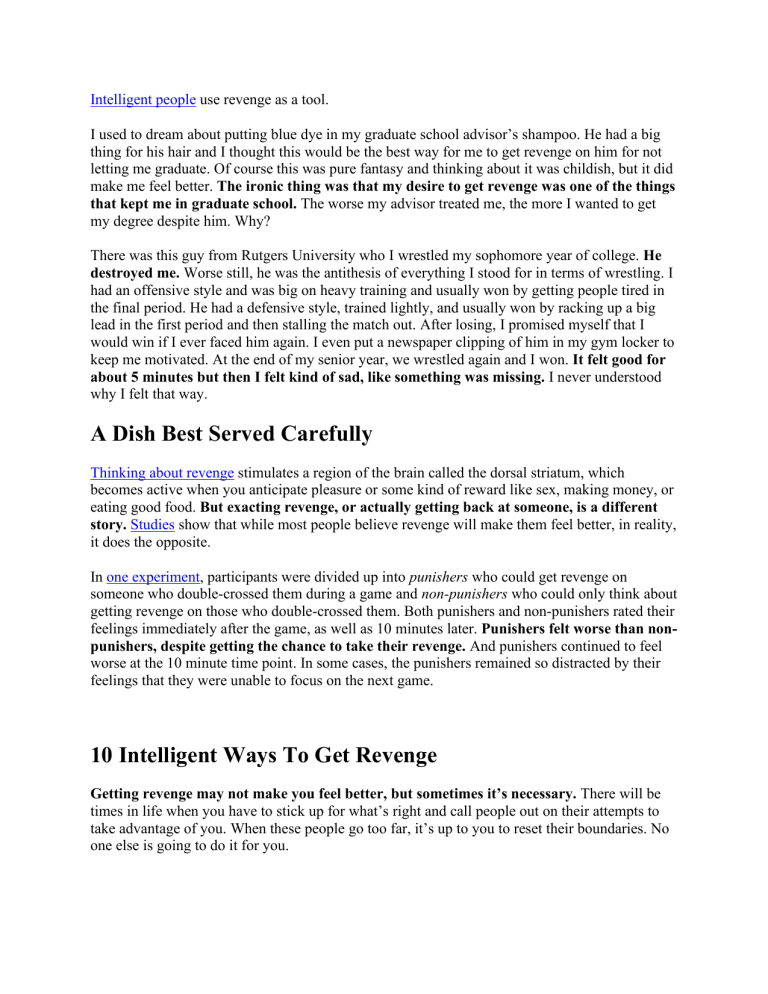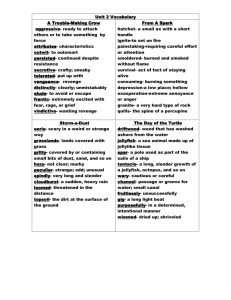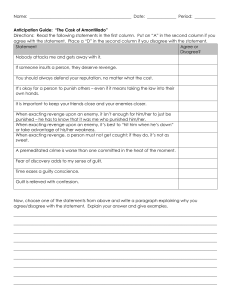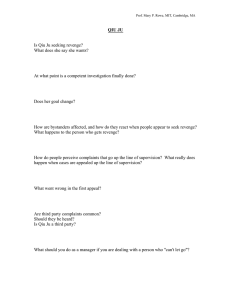
Intelligent people use revenge as a tool. I used to dream about putting blue dye in my graduate school advisor’s shampoo. He had a big thing for his hair and I thought this would be the best way for me to get revenge on him for not letting me graduate. Of course this was pure fantasy and thinking about it was childish, but it did make me feel better. The ironic thing was that my desire to get revenge was one of the things that kept me in graduate school. The worse my advisor treated me, the more I wanted to get my degree despite him. Why? There was this guy from Rutgers University who I wrestled my sophomore year of college. He destroyed me. Worse still, he was the antithesis of everything I stood for in terms of wrestling. I had an offensive style and was big on heavy training and usually won by getting people tired in the final period. He had a defensive style, trained lightly, and usually won by racking up a big lead in the first period and then stalling the match out. After losing, I promised myself that I would win if I ever faced him again. I even put a newspaper clipping of him in my gym locker to keep me motivated. At the end of my senior year, we wrestled again and I won. It felt good for about 5 minutes but then I felt kind of sad, like something was missing. I never understood why I felt that way. A Dish Best Served Carefully Thinking about revenge stimulates a region of the brain called the dorsal striatum, which becomes active when you anticipate pleasure or some kind of reward like sex, making money, or eating good food. But exacting revenge, or actually getting back at someone, is a different story. Studies show that while most people believe revenge will make them feel better, in reality, it does the opposite. In one experiment, participants were divided up into punishers who could get revenge on someone who double-crossed them during a game and non-punishers who could only think about getting revenge on those who double-crossed them. Both punishers and non-punishers rated their feelings immediately after the game, as well as 10 minutes later. Punishers felt worse than nonpunishers, despite getting the chance to take their revenge. And punishers continued to feel worse at the 10 minute time point. In some cases, the punishers remained so distracted by their feelings that they were unable to focus on the next game. 10 Intelligent Ways To Get Revenge Getting revenge may not make you feel better, but sometimes it’s necessary. There will be times in life when you have to stick up for what’s right and call people out on their attempts to take advantage of you. When these people go too far, it’s up to you to reset their boundaries. No one else is going to do it for you. In the book Beyond Revenge: The Evolution of the Forgiveness Instinct, author and psychology professor Michael McCullough explains that revenge serves an evolutionary purpose. By exacting revenge, you make a person’s gains less profitable, which helps prevent them from hurting you in the future. McCullough also explains that revenge becomes even more important when other people have witnessed you being mistreated because, in this case, there’s a chance that others will learn that you are the type of person who puts up with mistreatment. The key is to get revenge intelligently, without getting overly defensive and without getting distracted from your overall purpose in life. Here are 10 ways intelligent people get revenge: 1. Speak through your work. The best way to get revenge is to stay supremely rational. Don’t let your emotions dictate your actions. And don’t make revenge personal. Getting emotional and personal will distract you and cause you to do things that you’ll feel bad about later. Instead, make it professional. Operate as if getting revenge is a business decision. Someone has affected the cost-benefit ratio of your life and now you need to move a chess piece to prevent them from taking more from you in the future. The best way to do this is to put a spotlight on their behavior. But again, be professional. Write a review about them online. Use them as an example in a professional article, book, or speech. Create a URL with their name and use it to report their devious actions. Just make sure you’re honest and that it’s actually worth your effort. 2. Get transparent. Most people hate conflict. But, at the same time, most people have aggressive desires. So, these people have learned to go underground and attack others passively. In life, there are those who will talk about you behind your back, promise support that never comes, or get others to attack you on their behalf. The best revenge against these kinds of passive aggressive actions is transparency. Don’t try to hide the conflict you’re involved in. Instead, showcase it. Talk about your faults and your conflicting feelings. Use what you’re going through to teach others. This kind of vulnerability does not come easy. It takes practice. The more you practice being transparent and authentic, the better you position yourself against others who want to attack you. In any battle, the person who can be the most vulnerable, without losing their position, will win. 3. Grow your network. When you get attacked, especially by someone close, one of your first instincts will be to isolate yourself. You’ll feel depressed and unsure of who you can trust. So, you’ll start to put up walls. This is always mistake. Isolating yourself after an attack just opens you up to further attacks. It’s like retreating further and further into a castle that’s already been invaded. A better strategy is to move straight into the forces coming against you. Go into the obstacle, not around it. Instead of turning away from people, open yourself up to them. Talk with your friends and family members, and make new friends. Build up your connections. The more connections you have, the more lines of communication you have. And communication is a critical component of winning any battle. 4. Hijack their focus. The worst thing about other people doing you wrong is that they can get inside your head and hijack your focus. And once they’re in your head, fighting against them is like fighting against yourself. The best way to get someone out of your head is redirect both your focus and their focus. As it stands, you’re thinking about how they wronged you and they’re thinking about how you might respond to them directly. So, get indirect. Go above them or create an ally with one of their enemies. This is what I had to do to get out of graduate school. I set up a meeting with the dean of the graduate school who then called my advisor to ask him about the situation. Suddenly, my advisors attention went from how he could win against me to how he could protect himself from further scrutiny. Two weeks later he told me I could graduate. If an individual or a business is treating your poorly, go above them. Send an email or a letter to their boss or to the company’s CEO or VP. This will shift their attention from battling against you to protecting themselves from someone else. 5. Hire them. Imagine someone blatantly taking advantage of you and you turning around to give them a gift, or get them a job, or ask them for advice. Who becomes the powerful one in this scenario? Who becomes the petty one? Doing something good for someone who wrongs you is not a sign of weakness, it’s a sign of intelligence. Turning the other cheek diffuses other people’s power. It sharpens the contrast between you and them, highlighting their negative actions against your positive response. It also has a stupefying effect that allows you to peer deeply into how these people think and what they really want. 6. Create a void. When someone gets one over on you, your first reaction will be to get one over on them. You’ll want to seek justice by holding a mirror up to their face to showing them why they are wrong. This is a complete waste of time. No one thinks their wrong, at least not right away. By immediately retaliating against someone, you add energy to the situation and strengthen their resolve against you. You also expose your position. A better strategy is to sit on your hands and let things marinate. This is especially true when someone attacks you online. Don’t show any signs of weakness or distress. Instead, slowly phase yourself out of the situation. Then, wait to see how others respond. Create a void and see what fills it. This will give you perspective and help you gain clarity over how you can best use this situation to your advantage. 7. Create a fog. Start seeing people coming against you as a gift. At least now you know where they stand. And once you know where they stand, you can start misdirecting their next steps. There are a lot of people in life who will want to hold you back from getting what you want. They’ll want to hold you back, not because they want what you want, but because your growth and your gain highlights their inactivity. When you come against people like this, simply note who they are and avoid telling them anything personal in the future. Without knowing who you really are and what you really want, these people won’t know how to hold you back. 8. Get in shape. One of the first things people do after a tough relationship break up is start working out. Why? People who work out 2-3 times a week are more emotionally intelligent, make better decisions, and maintain more balanced hormone levels. Plus, if you look great and feel great, who cares what else happens to you? Your health is worth more than all the money or power in the world, which is why increasing it is such a great way to get revenge. It supersedes everything in life but is often taken for granted. So, when you get in shape, you highlight those against you who are not in shape, while also reaping all of the health benefits that come with it. 9. Start a business. Making something happen for yourself is the best revenge. People coming against you has a way of making you feel out of control. Sometimes it can seem like the whole world is trying to hold you back. But this is just an illusion. In reality, very few people are concerned with you. Everyone is too busy trying to better their own lives, and rightfully so. The best way to get back at a world that won’t support you, so to speak, is to build something on your own. Learn the art of self-reliance. Show initiative. Launch a business, form a partnership, or start a non-profit. Don’t overthink it, just start it and see where it takes you. 10. Turn it into your WHY. The desire to get revenge is a powerful, motivating force. What a shame it would be to waste it. That nagging feeling you get when someone mistreats you is really your best friend. The problem is that most people want to fix this nagging feeling when they should be using it as an itch to improve their lives. Study after study show that revenge, once exacted, is not sweet. It’s the process of plotting revenge that lights up the reward centers of our brains. So, use this to your advantage. Turn your desire to get revenge over those who wronged you into a strong reason WHY — a reason to grow and to keep taking action to bigger and bigger goals.







